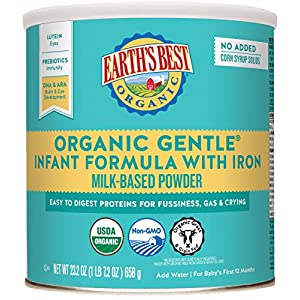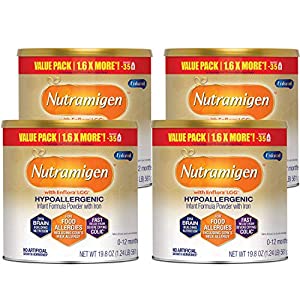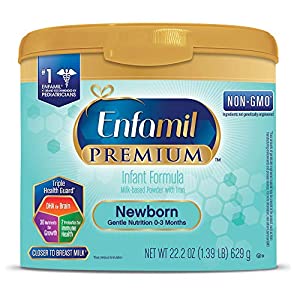Everyone knows that breastfeeding is the best way for babies to get the nutrition they need and to protect against infection and disease. However, sometimes breastfeeding is not an option for parents. Moreover, breastfeeding versus baby formula doesn’t have to be an either-or debate. It can also be beneficial to add baby milk formulas into the mix as it can help babies struggling to get the nutrition they need, mums struggling with supply, or to help babies with reflux issues.
Given all this, it is clear that most parents will use a variety of formulas and milk to ensure their babies get the best nutrition. Given there are so many different types of milk now available, it can be hard to know what is the best formula milk for babies.
In this post, we will take you through the benefits of breastfeeding, why you might consider combining breast and bottle, look at the different milk types suitable for babies, and introduce to our recommended milk types for babies to make your life that little bit easier.
Our Top Picks Milk for Babies 2022
Best Milk Brand for 1 Year Old’s: Meyenberg’s Whole Powdered Goat’s Milk
For milk that is easy to digest, is closer to human milk than cow’s milk, and packed full of beneficial nutrients, choose goat’s milk.
Best Organic Milk: Earth’s Best’s Organic Gentle Infant Powder
For USDA certified organic milk formula for babies with non-lactose based digestive issues, try this cow milk-based organic formula.
Best Milk for Babies with Acid Reflux: Enfamil’s Nutramigen Hypoallergenic Colic Baby Formula
For babies suffering from acid reflux, whether mild or severe, this can offer quick relief (always consult a doctor first when using hypoallergenic baby formulas).
Best Soy Milk for Babies: Good Start’s Non-GMO Soy Infant and Toddler Formula Powder
For lactose-free baby milk formula packed full of nutrients beneficial for eye and brain development.
Best Formula Milk for Newborn Babies: Enfamil’s Premium Newborn Non-GMO Infant Formula
For a formula designed for the earliest months in your newborn’s life when needed.
What are the health benefits of breastfeeding?
More than 80% of newborns are breastfed in the USA. It is also recommended that babies should be exclusively breastfed for the first 6 months. However, a study for the Centers for Disease Control and Prevention (CDC) found that only 1 in 4 babies are still being exclusively breastfed at 6 months. This can be for a range of reasons, but it is worth remembering the benefits of breastfeeding before thinking about moving on to the pluses of formulas and other milks.
#1 Perfect design
Your body naturally produces the perfect milk for your baby. It even adapts over time to meet your baby’s changing needs as they grow. Breastfeeding also has a number of long-term benefits that will last your baby into adulthood.
#2 Infection and disease protection
Breast milk helps to protect your baby against infection and disease. The longer you breastfeed, the better the protection and the longer this protection will last. Breastfeeding reduces the risk of things like diarrhea and vomiting, sudden infant death syndrome, childhood leukemia, obesity, and even cardiovascular disease in adulthood.
#3 Personal health benefits
Breastfeeding also has benefits for the mother. For example, studies have shown that it lowers the risk of breast cancer, ovarian cancer, osteoporosis, cardiovascular disease, and obesity.
#4 Availability
Being a parent usually comes hand in hand with an abundance of baby equipment every time you leave the house. One benefit of breast milk is that it naturally ticks one item off your list a, for mothers able to breastfeed, it is there on demand when your baby needs it.
#5 Bonding
Whilst it is not necessary to breastfeed to bond with your baby, studies have shown that skin to skin contact helps to build a strong emotional bond.
What are the benefits of combination feeding?
Before moving on to the different types of milk appropriate for babies, let’s take a look at some of the reasons people choose combination feeding. Combination feeding simply refers to people combining breastfeeding with either expressed milk or formula. As already alluded to, people introduce bottle feeds for a range of reasons:
#1 Difficulties breastfeeding
Some babies struggle to latch on when breastfeeding making it difficult to get the good feeds they need. Formula and bottle feeding can help with this.
#2 Express feeding
Sometimes, life means we have to go back to work sooner than wanted, or we have to spend time away from our babies for other reasons. Express feeding also offers partners the opportunity to form a stronger bond with their newborn.
#3 Vulnerable babies
Some babies may need a formula feed before breastfeeding. For example, if they are sick, vulnerable, or regularly suffering from reflux and you have been advised to do so by a health professional.
#4 Introducing formula
If you are looking to introduce formula into your baby’s diet or reduce the amount you are breastfeeding, then it can be beneficial to introduce bottle feeding slowly. When introducing the bottle for the first time it is actually better to do so when your baby is feeling relaxed rather than being very hungry. It is also recommended to feed from a bottle in a different position to breastfeeding as this can help.
If you have decided to introduce formula into your baby’s diet, then it is important not to chop and change too often. If you do think your baby is struggling with a specific brand, always speak to your doctor before making a change as this can have a negative impact on digestion and other tolerance issues. It is important to remember that formula milk does not offer the same protection against illness as breastfeeding or any of the health benefits.
What are the different baby formulas for?
Baby formulas either come in a liquid or powdered form. Liquid options are ready to go but go off quickly. Powdered forms last longer but need to be made up with water that has been boiled first to ensure they do not contain any unwanted bacteria. Formulas have a range of ingredients with some form of milk always one of them. Here, we outline the main baby formulas and why they tend to be used.
#1 First Infant Formula: Cow’s milk base
- Most common formula base ingredient.
- Contains proteins whey and casein.
- Whey thought to be easier to digest.
- Suitable from birth.
#2 Goats’ milk formula
- Suitable from birth.
- Not suitable for infants with an allergy to cows’ milk.
- High in prebiotics
- Casein profile closer to human milk than cow’s milk
- Lower in cholesterol than cow’s milk
#3 Hungry milk
- Sometimes suitable from birth but check with health professional.
- Contains more of the casein protein which is harder for babies to digest.
- Doubts over evidence base and whether this achieves intended goals of keeping hungrier babies fuller longer and easier to settle and sleep longer.
#4 Comfort formula
- Sometimes suitable from birth but check with health professional.
- Intended to help with digestive issues such as colic and constipation.
- Evidence inconclusive on whether the partially broken down cow proteins in this mix do this.
- Not suitable for babies who are allergic to cows’ milk
#5 Lactose-free milk formula
- Sometimes suitable from birth but check with health professional.
- Suitable for babies with lactose intolerance.
- Signs of lactose intolerance include diarrhea, abdominal pain, or bloating from wind.
#6 Hypoallergenic formula
- Only suitable from birth under medical supervision.
- Made with fully broken-down proteins.
- Prescribed when babies diagnosed with a cow milk allergy.
#7 Anti-reflux formula
- Only suitable from birth under medical supervision.
- Thickened to prevent reflux (babies bringing their food up after feeding).
- Sometimes called staydown formula.
- Water used to make it up must be boiled and not dip to below 70C before use.
- Speak to a medical professional before using this formula.
#8 Follow-on formula
- Suitable after 6-months but check with health professional.
- Not suitable under 6 months.
- Comes with added iron and vitamin D.
- No evidence to show health benefits for your baby.
Top 5 Milk for Babies, Toddlers and Newborn 2022
#1 Best Milk Brand for 1 Year Old Baby: Meyenberg’s Goat’s Milk
If you are in search of the best whole milk for babies then you should check out the benefits of goats milk. Studies have found that many people, and babies in particular, find goat’s milk easier to digest than cow’s milk. This may be due to the fact that its chemical make-up is more similar to human breast milk than cow’s milk is. Goat’s milk also has a much creamier taste for those whole milk lovers.
Other things to like about this goat’s milk formula are that: it contains more potassium than cow’s milk; it is high in protein which can help to stave off hunger in hungrier babies; it is gluten free, making it a good choice for those suffering allergies and other digestive issues; it is high in calcium; and; it is cheap. The downside of this product is that it is not specifically designed for babies, although goat’s milk is suitable from birth.
#Goat’s_Milk #Baby_Milk #Goat_Milk_Powder #Calcium #Creamy
#2 Best Organic Milk for Babies: Earth’s Best’s Organic
If you are looking for the best cow’s milk for babies that is also organic, then you’ll love this great formula. This formula has been specifically designed to aid with digestion for babies struggling with this in the first twelve months of their lives. The partially hydrolyzed proteins help to ensure this ease of digestion whilst offering the necessary nutrients your baby needs to grow healthily. This non-GMO and organic product ticks a lot of boxes.
Other things to like about this organic milk-based powder are that: it contains a range of nutrients known to assist with the development of both the eye and the brain; it is certified non-GMO and organic by the USDA; it helps calm babies known for fussiness or struggling with lots of gas, and; it has added iron for healthy growth. The downside of this product is that it is made with palm oil which is not very environmentally friendly.
#Organic #Organic_Baby_Milk #Organic_Baby_Formula #Non_GMO_Baby_Milk #Baby_Formulas
#3 Best Milk for Babies with Acid Reflux: Enfamil’s Nutramigen Hypoallergenic
Signs of severe reflux include crying and irritability, refusing to eat, frequent or projectile vomiting, wheezing, coughing, and bloody stools. If you notice these symptoms, then you should contact your doctor straight away. This milk formula is hypoallergenic and designed to help babies suffering from digestive issues, such as acid reflux. This is the best milk for newborn babies who are lactose intolerant and is also designed to benefit babies suffering from colic.
Other pros of this baby milk formula are that: it is suitable to babies allergic to cow’s milk; it contains a number of the beneficial minerals found in breast milk in their generalized form; it contains the LGG probiotic, recognized for assisting with digestive issues and managing allergies, and; it can be used through the first 18 months. You should contact your pediatrician before using this formula as it is recommended to get medical advice before using hypoallergenic milk formulas.
#Baby_Milk #Baby_Formula #Hypoallergenic #Lactose_Free #Cow_Milk_Allergy
#4 Best Soy Milk for Babies: Good Start’s Non-GMO Soy Infant and Toddler
This soy milk for toddlers comes with added iron to foster healthy development as your baby grows from being a baby into a full-blown toddler. As it is made with soy, it is suitable for those suffering with a lactose intolerance and can help those who suffer from excessive gas and digestive issues as well. It is also enriched with DHA which is known to benefit the development of the brain and eyes.
Other pluses of this soy-based toddler formula are that: it contains an abundance of calcium and vitamin D, aiding healthy growth and development; it is designed to support your baby as they grow into a toddler between 9 and 24 months old, and; it also contains beneficial coconut oils making it a good choice for those looking to benefit from coconut milk for toddlers. The downside of this product is that it is pricey.
#Soy_Milk #Baby_Soy_Milk #Baby_Soy_Formula #Baby_Coconut_Milk #Toddler_Formula_Milk
#5 Best Formula Milk for Newborn Babies: Enfamil’s Premium Newborn
Where possible, babies should be fed with only breast milk for the first 6 months of their lives at least. However, when this isn’t possible or you have been advised by a doctor to supplement it with formula milk, then this is well worth checking out. Designed to offer milk akin to breast milk with non-GMO ingredients. This formula is created for the first three months you your baby’s life when vital nutrition is needed.
Other benefits of this infant formula for newborns are that: it contains high levels of Omega-3, inositol, and DHA, known to nourish brains; it is designed to be easy to digest; it contains 2 prebiotics that target improved immune health, and; it helps foster healthy growth and development. The downside of this product is that it is only suitable for the first 3 months of your baby’s life, when it is best to be offering breast milk if possible.
#Newborn_Formula #Newborn_Milk #Newborn_Formulas #Enfamil #Non_GMO_Formulas
Conclusion
When it comes to the best milk for babies, breast milk is always best when possible. However, formula has its place as they get older, if they are struggling to breastfeed, have issues with nutrition, or need some help with things like colic and acid reflux. The list above is our top picks for differing baby needs and diets.




